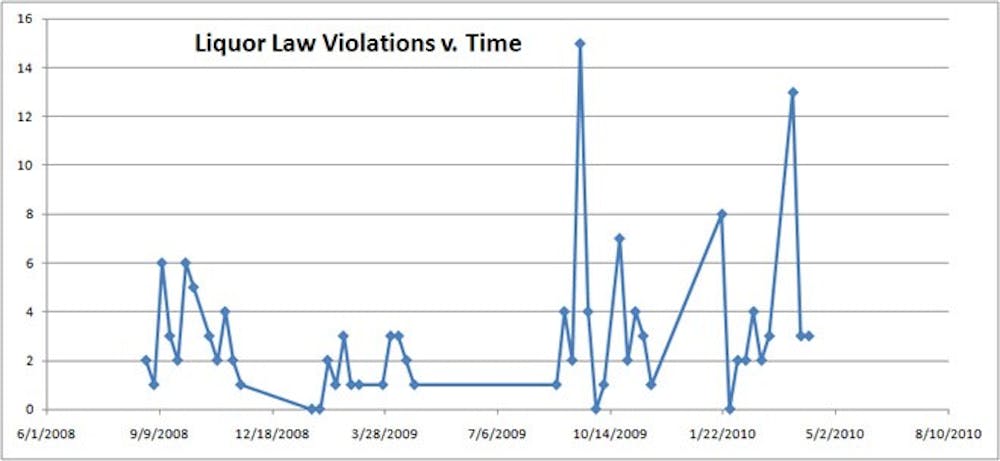More University of Richmond students are abusing prescription drugs, and experimenting with varieties of new recreational drugs, according to Richmond deans and police.
"Hearing a lot of kids commenting on it; K-12, K-2, some of that synthetic marijuana type," URPD Investigations Officer, Tim Mihalcoe, said. "Some of these are still legal."
Daniel Fabian, Richmond College associate dean, said, "The new trend for students is prescription drugs." While noting that friends sharing drugs was a national trend, he added, "It's very hard to catch, it's just a pill."
The Collegian managed to speak to a drug dealer, a graduating Richmond College senior, who refused to identify himself further. Here is that interview:
Q: Why do you do it?
Because I don't need my medication; every month I have a couple extra pills, and why not make some money out of it?
Q. Who are the people you sell to?
They are my friends for the most part. Sometimes I sell it to my friends at VCU. If the market price at VCU is lower than at Richmond, I sell at Richmond, and vice versa.
Q. How much of a profit do you make?
$5 to $10 dollars a pill. About 30 to 50 bucks a month.
Q. Do you care about the people you sell to?
For the most part, I do. It is beneficial because it helps them study, and I am making money off of it. I don't sell them enough to abuse it. Probably two at a time.
Enjoy what you're reading?
Signup for our newsletter
Q. What is the drug that you sell?
Medication for ADHD — Ritalin or Adderall.
Q. Are you aware of their side effects?
Yes.
Q. Why do you still sell them?
They know the risks themselves. Everyone I sell it to has done it before many times. I have never sold it to anyone who never took it before.
Sexual Violence
"It's probably the most under-reported crime that occurs," Chief of Police Robert Dillard said of sexual assault and rape at Richmond.
In the last year and half, according to "Police Reports" published in The Collegian, only two sexual assaults have occurred in Richmond. According to a study of campuses by Mary Kos in 1985 for Ms. Magazine, 1 in 4 college women have either been raped or suffered attempted rape.
"We want female or male victims of sexual assault to come forward," Mihalcoe said. He added that even if victims don't file charges, they can help identify serial rapists by reporting rapes and assaults.
Patrick Benner, Richmond College associate dean, said, "The ultimate decision is the victim's decision, and you have to respect what that person's decision is."
Dillard acknowledged URPD, CAPS and the Richmond and Westhampton Dean's offices for providing support to rape victims. "On this campus... women do not generally tend to support other women who are victims," he said, however. "If you are a female and raped on this campus, and you pursue with criminal charges, the environment is small enough that students are going to most likely know both sides."
He explained that acquaintances of the alleged rapist, including other women, generally side with the rapist, and while the victim is not necessarily taunted, she is subtly sneered at.
"If they walk through the dining hall, the eyes fall upon them," he said of Richmond rape victims. "Most of our victims end up leaving school."
Rape victims can be victimized three times- once during the actual rape, again as they manage campus life, and once again as they pursue legal process in court, Dillard said.
"As a matter of policy, we have our victim sit down with the prosecutor in the jurisdiction, and have a very frank and open discussion about the probability of a successful prosecution, and make them fully aware of what the trial is going to be like." he said. "We do not want to lead them into that third victimization."
URPD advises all rape victims to speak with their parents. "We know that the victim is going to need somebody long-term, long after they have left the University of Richmond."
"It goes so much further than the act itself. It is hard to be a victim."
Crime Prevention
Both Fabian and Dillard, however, lauded Richmond students for the university's low crime rate in relation to other college campuses. "We've got a bunch of good students here," Police Chief Dillard, who is finishing his 40th year at the university, said. "We are lucky in that we don't have reports of violent crime that other campuses have. Homicides are reported in other college campuses."
Fabian said, "One of the most difficult things is that (Richmond) students are a little too trusting of other students." Benner said that he kept informed of crime in other college campuses via listserv, an electronic mailing list application. He added, "Because we are such a small campus, it feels like things are more present, because it's a small population."
URPD Crime Prevention Officer, Randy Baran, said Richmond is unique because it is a private school. "But college policing is college policing," he added.
Baran praised Richmond's crime prevention programs, especially the UFA Campus Watch program initiated this spring semester. "We have many resources to go to that your local jurisdictions sure don't have," he added. "Unfortunately with crime prevention, you don't get statistics and numbers on the crimes you do prevent."
Deans and police were asked if publishing names of arrestees in The Collegian's "Police Reports" would stigmatize crime, and help reduce it. "I don't think humiliation works as a deterrent to crime," Captain Beth Simonds, URPD Services Commander, said. "It subjects people to ridicule."
Dillard, though receptive to the idea of publishing arrestee's names, said, "This is such a small institution that a student can very easily be labeled."
Fabian said, "You don't want to ruin a student's life for something that might have happened while they were intoxicated. And this is such a small community (that) they don't need that."
Benner said of the effect of alcohol on students, "With crime, there's also a substance involved."
"An act of vandalism or crowd vandalism, alcohol is involved, if there is an assault, alcohol is involved. There is usually a common denominator in incidents on campus, and generally it involves alcohol."
Contact staff writer Tanveer Ahmed at tanveer.ahmed@richmond.edu.
Support independent student media
You can make a tax-deductible donation by clicking the button below, which takes you to our secure PayPal account. The page is set up to receive contributions in whatever amount you designate. We look forward to using the money we raise to further our mission of providing honest and accurate information to students, faculty, staff, alumni and others in the general public.
Donate Now



